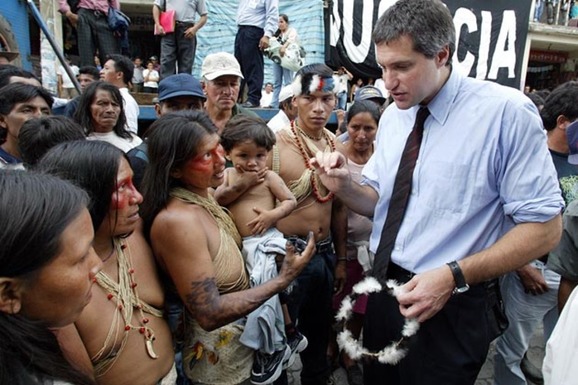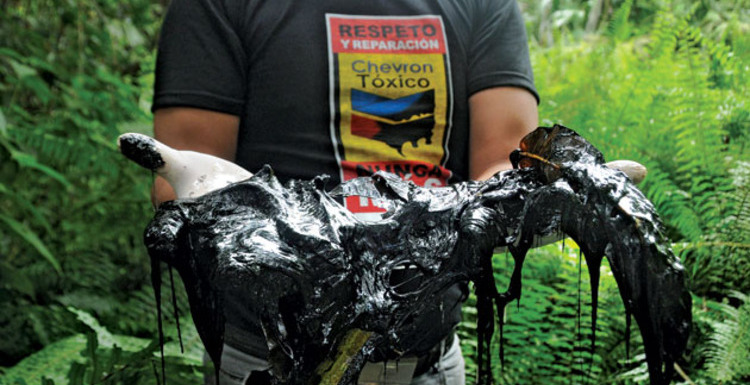New York Justice Sputters in the Ecuadorian Oilfields
A longstanding legal battle between indigenous Ecuadorians and the megalithic U.S. corporation Chevron has decisively tipped in favor of the oil giant and other global resource extraction firms. On March 7, Washington law firm Patton Boggs agreed to pay $15 million USD to Chevron in order to settle an unprecedented fraud charge leveled by the corporation in a New York federal court in 2011. [1] This settlement is the latest chapter in a struggle that has pitted Chevron against a group of residents of Lago Agrio in the Ecuadorian Amazon and their legal team, led by New York attorney Steven Donziger. Patton Boggs’ initial decision to represent the Ecuadorians came as a surprise, since the Washington law firm was known as a favorite of right-wing dictatorships during the Central American civil wars of the 1980s. Now, Patton Boggs has become the latest of several members of Donziger’s legal team to distance themselves from the case under intense pressure from Chevron. While the settlement precludes Patton Boggs from any further responsibility, Donziger has stated he will continue to fight the fraud charge, which came in response to a landmark 2011 ruling against Chevron in an Ecuadorian provincial court.
The residents of Lago Agrio, who call themselves the afectados (the affected ones), filed suit in 1993 on the allegation that Texaco had dumped 18 billion gallons of toxic waste in the Ecuadorian Amazon during its 23 years of operation there, leading to acute environmental devastation, health problems, and the resultant loss of livelihoods on a vast scale. [2] The suit outlived Texaco and continued after Chevron acquired the company in 2001. After nearly two decades of proceedings, Ecuadorian judge Nicolas Zambrano awarded the plaintiffs $18 billion USD in damages, which was later reduced to $9.5 billion USD on appeal. [3] The ruling was hailed as a historic achievement by indigenous peoples in the struggle against exploitation of their land holdings at the hands of transnational corporations (TNCs). The plaintiffs’ victory marked the first time a TNC was held responsible for damages to indigenous peoples in a foreign court.

However, Chevron countered with an equally bold response: suing the prosecutors in U.S. federal court. Despite issues of murky jurisdiction and grave implications for international law, their ploy eventually worked. [4] In March, Manhattan federal judge Lewis Kaplan ruled that the judgment against Chevron in an Ecuadorian provincial court was tainted by fraud and bribery on the part of Donziger and his team. [5] While the audacious victory certainly spoke to the acumen of Chevron’s legal team, as well as the company’s vast financial resources, it represents a grave loss for the afectados and the prospects of other communities determined to stand up to rampant corporate exploitation.
Since Chevron no longer has a presence in Ecuador, the plaintiffs have been forced to open cases in Argentina, Brazil, and Canada in order to claim Chevron assets as payment. Some legal analysts suggest that the New York ruling and later settlement will hurt their prospects in these cases, although Donziger and his team downplay the impact. [6] Additionally, Chevron’s vicious retaliations can surely be regarded as a way to dissuade U.S. law firms from taking on such cases in the future. Patton Boggs’ settlement and subsequent distancing from the rest of Donziger’s team suggest that this tactic has largely succeeded. Judge Kaplan did not detail whether Patton Boggs itself had engaged in racketeering, but it seems that the firm has decided to cut its losses and avoid any further risk stemming from the case. Donziger referred to Patton Boggs as “the latest victim of Chevron’s campaign of intimidation.” [7]
The legal intricacies of each party’s accusations are beyond the scope of this article. However, the evidence seems to suggest that some level of attempted bribery and unethical actions likely occurred on both sides, a fact that escapes most of the reports on the case. Moreover, whether or not Donziger’s legal team (or Chevron’s) engaged in attempted bribery or ghostwriting, the ruling essentially stands as a U.S. judgment of the Ecuadorian court system. Judge Kaplan himself characterized the case as such, referring to it as “an independent action for relief from an allegedly fraudulent judgment” [8, p. 3] The New York federal court is therefore complicit in the violation of Ecuador’s legal sovereignty.
The Chevron case once promised a new path for indigenous voices to be heard on the global stage. However, thanks to corporate-friendly U.S. courts, the precedent set by Judge Kaplan gave TNCs a powerful tool for retaliation. In 2008, a Chevron spokesperson said, “We’re going to fight this until Hell freezes over—and then we’ll fight it out on the ice.” [9] For now, this vow seems to have produced successful results.
Alexander J. Preiss, Research Associate at the Council on Hemispheric Affairs
Please accept this article as a free contribution from COHA, but if re-posting, please afford authorial and institutional attribution. Exclusive rights can be negotiated. For additional news and analysis on Latin America, please go to: LatinNews.com and Rights Action.
References
[2] http://chevrontoxico.com/about/
[3] http://www.nytimes.com/2011/02/15/world/americas/15ecuador.html
[4] http://chevrontoxico.com/assets/docs/2014-chevrons-mockery-of-justice.pdf
[6] http://www.reuters.com/article/2014/03/07/us-chevron-ecuador-canada-idUSBREA261P820140307
[8] http://chevrontoxico.com/assets/docs/2014-chevrons-mockery-of-justice.pdf
[9] http://www.newyorker.com/reporting/2012/01/09/120109fa_fact_keefe?currentPage=all


